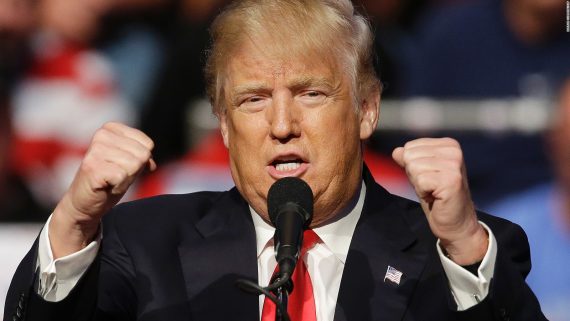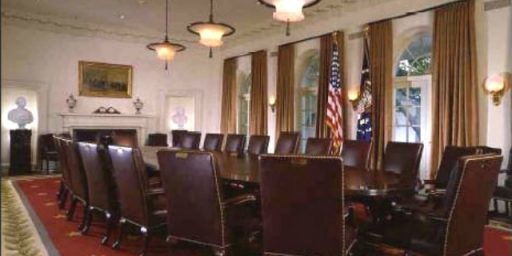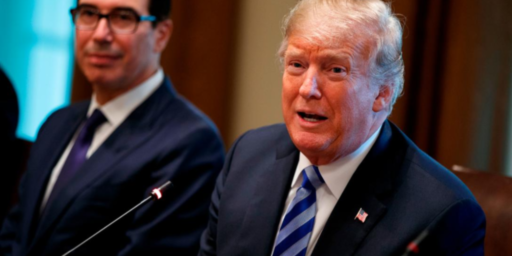The Trump Administration and the G20
More stepping back from free trade and the established global economic order.
 Via WaPo : New rifts emerge as Trump administration rejects free trade statement at G-20 meeting
Via WaPo : New rifts emerge as Trump administration rejects free trade statement at G-20 meeting
The Trump administration on Saturday rejected a statement from other leading economies that warned against the perils of trade protectionism, the latest sign of how the administration’s more combative approach to diplomacy could create rifts with U.S. allies and leave traditional partners in the dark about the direction of U.S. policy.
Treasury Secretary Steven Mnuchin, appearing at a gathering of economic ministers and central bankers from the 20 largest economies, rebuffed multiple entreaties from German officials to include in the meeting’s joint statement language emphasizing the importance of free trade and that it should be conducted in a “rules based” manner, following existing standards and agreements.
By rejecting language that would have said the United States is opposed to protectionism, the White House sent a clear signal that it would not accept existing trade norms and could pursue a more antagonistic approach with trading partners around the world. Such language has been considered ordinary and non-controversial in recent meetings of the Group of 20.
So, we are now working publicly at a major international forum to undermine the prevailing global economic order. For whatever criticisms that one could level, and all systems have flaws and problems, it is a system that has maintained peace at the global level since World War II (the Cold War was, mercifully, cold) and has seen the growth of market based economies across the world.
Meanwhile, it would appear that “making American great again” means retreating from global leadership and insulting key allies:
For many years, the United States has been the country rallying other nations to the cause of free trade and common language in the communiqués that follow meetings of economic ministers and central banks. Several European officials and one former U.S. official who had attended past G-20 meetings said it was the first time the United States had blocked such an effort.
The move follows new strains in the U.S. relationship with Britain and Germany, traditionally two of the country’s most steadfast allies.
This has not been a good week for the US in terms of international relations (see, also, a strange appearance with the the Irish PM, making up stories about the British and a very weird visit with the German Chancellor), and it continues to underscore the amateur nature of this administration. Supporters can gleefully note that Trump is acting as a disruptive force to the status quo (you know, as conservatives as so known to do…) but I would counter by noting that disruption without a strategy or understanding of the implications of those disruptions is dangerous, not clever (and “getting better deals” is not a strategy).
Gary Schmitt, co-director of the Center for Security Studies at the American Enterprise Institute, said Trump could be sending a signal to other leaders that this is a negotiation, and the actions by Mnuchin at the meeting are an opening bid.
“You make people come to you by laying out a strident position,” Schmitt said, summing up the approach Trump has used for years in real estate and business. “But over the long term, it’s much harder to hold to that. These are people who lead countries and have other trade agreements. The U.S. is going to learn it’s not as in-the-driver-seat as they think.”
This isn’t a real estate deal, a licensing agreement for use of a trademark, nor a reality TV show contract. This is global economics and international diplomacy.
The White House has said it thinks existing U.S. trade deals are unfair to American workers because the deals allow countries to lure away American jobs and send their goods to the United States at unfairly low prices. In addition to scrapping the Asian trade deal, Trump also has said he will renegotiate — or dump — the North American Free Trade Agreement.
Critics of this approach have said it could isolate the U.S. economy, make goods more expensive for Americans and hurt American companies that rely on exporting their goods around the world.
The angst about Trump’s approach quickly became the backdrop at the Baden-Baden meeting, and many foreign officials came seeking additional clarity from Mnuchin, whom most had never met. Mnuchin had spent his career in part at Goldman Sachs, starting a hedge fund and working as a Hollywood producer. They wanted to know whether he would veer from Trump on some of the economic nationalism they had heard coming from the White House.
He wouldn’t, they quickly learned.
[…]
“My primary focus is on economic growth in the United States,” Mnuchin said after meeting with Schäuble in Berlin. “I think that economic growth in the United States is good for us and good for the other major economies in the world.”
This is ultimately true, but to approach the subject from the position that all the deals are bad and have disadvantaged the US is hardly a productive way to deal with long-standing allies.
Some positives from the piece:
Still, Mnuchin agreed to numerous meetings as he said he wanted to develop relationships with his foreign counterparts. He met with top officials from France, South Korea, Japan, China, Saudi Arabia, the European Central Bank, Britain, Germany and Argentina, among others. His first international trip was a blizzard of bilateral discussions, with everyone trying to size up the new treasury secretary.
Despite the reservations about a variety of Trump’s positions, numerous officials said they were impressed with Mnuchin’s presentation and command of issues. So far, he is one of the only members of Trump’s Cabinet who has sought to develop relationships with other foreign leaders. They still don’t know whether they will be able to influence his thinking, but they feel he has a willingness to listen, several G-20 attendees said.
“To a person, they have said they have been pleased with the way he is coming at issues,” Morneau said. “He is very constructive and talking about good relationships with all of his international counterparts.”
Although, “So far, he is one of the only members of Trump’s Cabinet who has sought to develop relationships with other foreign leaders” is a bit of a serious critique of the rest of the cabinet.




To be fair, there is a double standard in a lot of these existing agreements where the opposite party talks a lot about free trade, but only the US is actually expected to abide by the terms of the agreement while everyone else completely ignores the agreement and continues to block access to their markets in various ways.
It’s similar to the situation with NATO, where everyone loves NATO as long as they’re talking about the US’s obligations to them, while completely ignoring their obligations to the organization.
In terms of politics, “conservative” is an essentially meaningless word, even more so in 21st Century America. Outside my area of expertise, but I understand psychologists who study “conservatism” eventually gave up trying to define it in terms of any policy or belief (a “conservative” Russian would be a communist) and concede it’s a psychological thing, not a political thing. The best practical definition I’ve seen is “blood, soil, and throne”. I think that fits Trumpskyites.
The ‘Obama tapped my Trump Tower’ thing proves that a)Trump follows and believes the Conservative Echo Chamber, and b) the CEC makes stuff up. He really is a petulant eight year old and he really is going to follow the protectionist preachings of the CEC radio talkers.
@gVOR08:
The best definition I’ve ever heard for conservatism as a political concept is “averse to / threatened by change”.
It doesn’t matter if the change is for the better. Their discomfort with having to adapt to change will cause them to oppose it.
At the end, what’s going to happen is that the rest of the world will finally give up on the US and leave us in our splendid pouting while they remake the global economy around us. I suspect Germany/France, China, and (maybe) India to be the three key geographic regions. Russia is turning into a has-been. They’ve got oil and minerals scattered across thinly-populated regions, but they’ve scared off most of their Soviet-educated scientists and engineers (who have emigrated elsewhere) and are actively trashing their educational pipeline.
What I don’t understand is why those who want to pull the US back from investing in science and technology or US education fail to understand that once we fall behind in the race, it’s even harder to catch up. And once we stop being the place in the world where the best and the brightest come for educational opportunities, that means somewhere else in the world becomes the lodestone, with the accompanying benefits.
Do these people really think of what they are doing? Or are they just too engrossed in their beliefs that they never check them against reality?
@gVOR08:
In the French Assemblee nationale of the late 18th century, the change agents sat on the left while the traditionalists (the monarchists and supporters of the nobility and the church) sat on the right.
That distinction remains consistent. The right/left split isn’t based upon policy per se, but on an appeal to heritage/tradition on the right vs. a belief in the virtues of progress on the left. The specific policies that come from those motivations can vary quite a bit — for example, conservatives in Australia pushed for gun control there, while Islamophobia in Europe can be found on both the right and the left.
The Trumpsters think that they are returning to some lost golden age. It’s antebellum nostalgia gone haywire.
My parenthetical italicized comment on conservatism was intended to note that contrary to labels, this is not an especially conservative type of behavior, whether in the way that @HarvardLaw92 defined it or in the Kirkian “only slow, deliberate change is good, since we cannot control for unintended consequences of massive change” way.
I know that a) American “conservatives” are often not very conservative, and b) this group in particular is not conservative. They are a weird mix of reactionary and radical (although I think more reactionary than anything else).
@Pch101:
Yup: reactionary (I saw your post after my comment). As with most reactionaries they think that the solution is to return to a previous state. And, as is the case with reactionaries, that which they want to return to is, in fact, imaginary.
@Steven L. Taylor:
The hardcore Trumpkins? They’re ethno-nationalist populists.
@CSK: Sure, and they want to go back to a time when America was “great” in their minds, which they link to white identity and power–and hence are reactionary.
They think the past was better.
Keeping in mind that they a) they really do not understand history, and b) they have an imagined idealized version of the past.
@Steven L. Taylor: @Steven L. Taylor:
The Trumpkins are the Know Nothing Party (The American Party), if you substitute Mexicans and Muslims for Roman Catholics in general and Irish and Germans in particular.
“My primary focus is on economic growth in the
United StatesMnuchin bank account,”Fixed that for him.
@CSK: Perhaps I am missing something–but what I am saying and what you are saying are not mutually exclusive.
Generically identity politics of this type have a reactionary core: it is a reaction to a perception of lost power and influence to other groups. The once dominant (or, heck, still dominant) group remembers in some vague way when it had more power than it thinks it has now, so hearkens back to an idealized past.
Without getting into fascism, per se, this is what Hitler did in talking about the loss of Aryan glory and the need to reestablish a new Reich and it is why Mussolini made clear allusion to the Roman empire in his rhetoric. And is it, at is base, what MAGA is: a call back to the mythical 50s (or something) when US industry was king and won all the wars.
@gVOR08:
@HarvardLaw92:
@Steven L. Taylor:
The most memorable and apt comment on conservatism I’ve read, a long time ago in a university history course, was by Benjamin Disraeli, “… a conservative government is an organized hypocrisy”
@Steven L. Taylor: They really also don’t understand the present, either, thanks to lies and fake news. A bad combination.
@reid: Sadly true.
I do think that we have entered into trade agreements to willingly in the past — they disrupt our own economy, and even if we end up with a modest net increase in jobs, there are still a lot of losers and we don’t do enough (anything?) to help them.
We tell our working class to pull themselves up by their bootstraps, as if they have a moral failing for growing up in a region that had a lot of textile work, and didn’t abandon their family, friends and community to move to San Francisco and open a restaurant serving fancy toast or whatever the next ridiculous trend is. I understand these people being bitter — I would be be bitter.
But the answer to the disruption caused by past trade deals isn’t to create even more disruption.
@Steven L. Taylor: The most useful definition of modern “conservativism” in the US is Cleek’s Law: http://ok-cleek.com/blogs/?page_id=18788
Today’s conservatism is the opposite of what liberals want today, updated daily.
It’s simple, predictive and mostly accurate. And it shows a mindset of people who have given up, and think that someone else has gotten their goods, and just want revenge. It’s why “conservatives” are such poor winners, and why they are incapable of governing.
I think it best fits the Trumpeters than the David Brookses of the world, but the Republican Party has been embracing the Trumpeters for far longer than Trump has been on the scene.
@Steven L. Taylor:
Nope, what you’re saying and what I’m saying aren’t mutually exclusive. But I do think that the Trumpkins are motivated far,far more by racial and religious issues–and vengeance against the so-called elite–than they are by, say, fiscal conservatism. They were never really happy with the Republican Party, but it was the best they could do till Mango Boy appeared on the scene.
It Trump said to them, “I will guarantee you a 99% white and 99% Christian (preferably fundamentalist Protestant) country, but it’s gonna a a socialist country, they’d settle happily for that.
@Steven L. Taylor: Trade delivered superior returns prior to the WTO. Capital flowed to developing countries which then increased their consumption and demand for American goods; this is the textbook model of how an economy becomes wealthier.
Since the WTO capital has flowed from developing economies to developed, forcing the poorer countries to consume less in pursuit of trade surpluses. This change coincides with a slowdown in growth of the developing world’s GDP and rapid growth of the developed world’s financial industry.
Trump isn’t wrong that some things were better in the past, but he and his people don’t have a clear idea of why those things were better and how we could get back to them.
@grumpy realist: Depends on which reality you’re looking at. Plot the trajectory on a horizon of “me, my wants, my needs, my desires, my money, my capital, my goals, my aspirations, and my gains/losses” and I believe why they resist becomes more clear. Remember too, that these are the people for whom Atlas Shrugged is the most important book they’ve ever read.
Imagine what they’d be like if they’d read The Virtue of Selfishness.
Sharon Angle expressed the attitude perfectly when she was running in Nevada against Harry Reid.
@Just ‘nutha ig’nint cracker: But Angle and the rest don’t seem to object to spending my money on things I don’t want or use, but they do.
@Just ‘nutha ig’nint cracker:
Probably half the Republican base believes in Sharron Angle.
She’s a mainstream ‘Ted Nugent’ Republican.
This is why I’m think we should just split up the country. Let the Ayn Rand types all go off and form their own Utopia with no government and those of us who believe in community and taxes being the price one pays for living in civilization shall go elsewhere.
I knew a physicist years ago who thought western civilization was an anomaly; we’d go back to barbarity soon enough. I can’t say his idea has been disproven lately.
But like the chinese government’s take on the French Revolution, maybe it’s too early to tell.
@Steven L. Taylor: The best explanation I’ve seen for the whole raft of changes DT is proposing is that he loves “hard power” and despises the instruments of “soft power.” Just to cite one example, this is reminiscent of draft dodger Dick Cheney turning into a super-hawk when it’s someone else that faces the risk. This is a malady for which there is no cure.
@Stormy Dragon: The only time Article V, the Collective Defense provision of the North Atlantic Treaty, was in September 2001, after the 9/11 attack. It was invoked by the United States and NATO alliance responded to help the U.S. defend itself. http://www.nytimes.com/2001/09/13/us/after-attacks-alliance-for-first-time-nato-invokes-joint-defense-pact-with-us.html
How soon we forget. Approximate 1045 NATO alliance soldiers were killed in Afghanistan, almost equal to 1/2 the American losses. https://en.wikipedia.org/wiki/Coalition_casualties_in_Afghanistan (I did not count the losses of Australia, New Zealand, Sweden, Jordan, etc. (allied non-NATO countries. Of course the Trump administration is busy insulting those countries to.) Meanwhile, Russia, China, and Iran are laughing away.
@al-Ameda: It should be remembered that Sharon Angle’s husband is a retired Federal employee of the Bureau of Land Management. Besides retirement pay, he and Sharon also receive health insurance through both FEHBP and Medicare and she was a part-time public school teacher for most of the seventies and eighties. In other words, there lives have been spent doing work funded by tax payers.
But apparently, abortion, and some of her tax money going for “those people” sent her around the bend sometime during the George H.W. Bush administration.
She has been a nut for at least 25 years when she joined up with the Nevada franchise of the far right “Constitution Party.” Of course she is no more nuttier than Koch brothers or the Mercers, folks who have become multi-billionaires over the last 30 years but somehow believe the U.S. is becoming a Socialist hell-hole, or for that matter believe Western Europe and Scandinavia are hell holes about to be overrun my Muslim hordes.